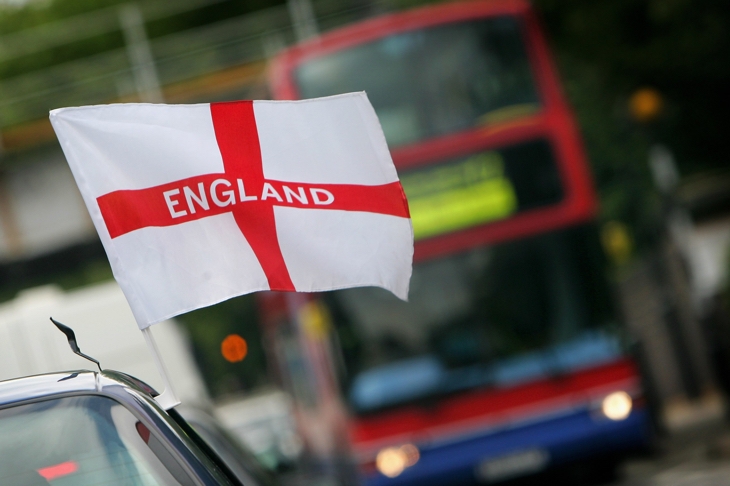On Monday evening, I watched a man in a smart shirt and trousers put his friend in a headlock while bellowing at the top of his voice. In the central London pub I was in, guttural roars filled the room; the floor shook with people jumping up and down. A few minutes later and a few hundred yards away, people – well, overwhelmingly men – flooded on to Tottenham Court Road to stop the traffic and share their emotions with drivers. They didn’t just hail them from the pavement; they stepped in front of cars until they decided each driver had witnessed enough of their ritual. This happened because Harry Kane had scored an injury time winner against Tunisia in England’s first World Cup group game. Goodness only knows what will happen if Gareth Southgate’s team beat a decent side, or if – heaven forfend – they do what is described in World Cup vernacular as ‘going deep in the tournament’.
God, I hate the England football team.
I don’t say that as a football denier, one of those people who emerges at every major tournament to complain that the documentary about tofu weaving in Angola has been postponed because of extra time in the game between Andorra and Chad. I’ve been going to football for 40 years and I’ve given far too much of my life and money to football over the years: I’ve edited a football magazine and hosted a football show on radio; I have a season ticket at QPR and when they’re not at home I sometimes go to watch non-League football; on holidays I try to catch a local team playing, even if it is extreme lower league football. I love being part of a football crowd, celebrating the intense connection brought on by extraordinary highs and crushing lows.
Nor do I say it as a rabid anti-colonialist who wants anything British brought low. I think of myself as leftwing, but I have no problem with there being a sense of British or English pride and identity. I cheer on English and British teams in other sports: I was delighted the England cricket team smashed Australia on Tuesday, breaking the record for the highest score in a one-day international in the process. I shout for British athletes, even if I half suspect they’re up to their eyeballs on performance enhancing drugs.
I just hate the England football team. I have done for years, and I don’t see much prospect of it changing.
I think it’s a product of my age and generation. I was in my teens in the 1980s, when any England team travelling abroad was accompanied by legions of hooligans, in the same way as sailing ships were accompanied by swarms of rats. It was hard to be proud of a national team when every column inch about its matches was countered by equal space about how the residents of some unassuming city were terrorised by the hordes of St George.
But the 1980s shaped my football fandom in a different way, because it was the last decade in which money had not flooded football and in which the players still bore some semblance of relation to ordinary people. Once hooliganism off the pitch started to subside, the players replaced the thugs as the objects of my disdain. By the end of the last decade the England team was filled with players any right minded person would cross the road to avoid: the one who was so shocked at a pay offer of £55,000 that he nearly swerved off the road (Ashley Cole); the one who was acquitted of affray despite punching a man three times after he failed to play a Phil Collins record (Steven Gerrard); the ones who taunted American tourists the day after 9/11, one of whom would later call another player a “black c**t” (John Terry), another of whom had made a sex tape with two of his England team-mates (Frank Lampard). One looked at the England team and thought they represented the strongest argument possible for burning the national flag.
In fairness, the current England team doesn’t seem so awful (though they are young players; there is time yet). But the performative, grotesquely over-exaggerated patriotism that surrounds them seems only to grow. The celebrations on Monday were not those of a normal football crowd, where the joy erupts and subsides, and is in direct proportion to the level of consequence of the goal. They were the celebrations of crowds determined to prove – to themselves, to observers – how much this match, this team, this country mattered to them, and why everyone else should feel the same way. You can insert your own Brexit metaphor here, if you like.
I thought I was alone in this feeling: a committed, English football fan willing the national team to failure. But when I asked around on Tuesday morning, I found many people saying the same thing, for the same reasons. Of course, echo chamber warnings apply, because I was talking to people I’m friends with, and the reason I’m friends with them is that we think the same way.
Maybe it’s just us. But we all want the same thing. Let England get knocked out as soon as possible, so we can watch the World Cup in peace.
Michael Hann is former music editor of the Guardian






Comments